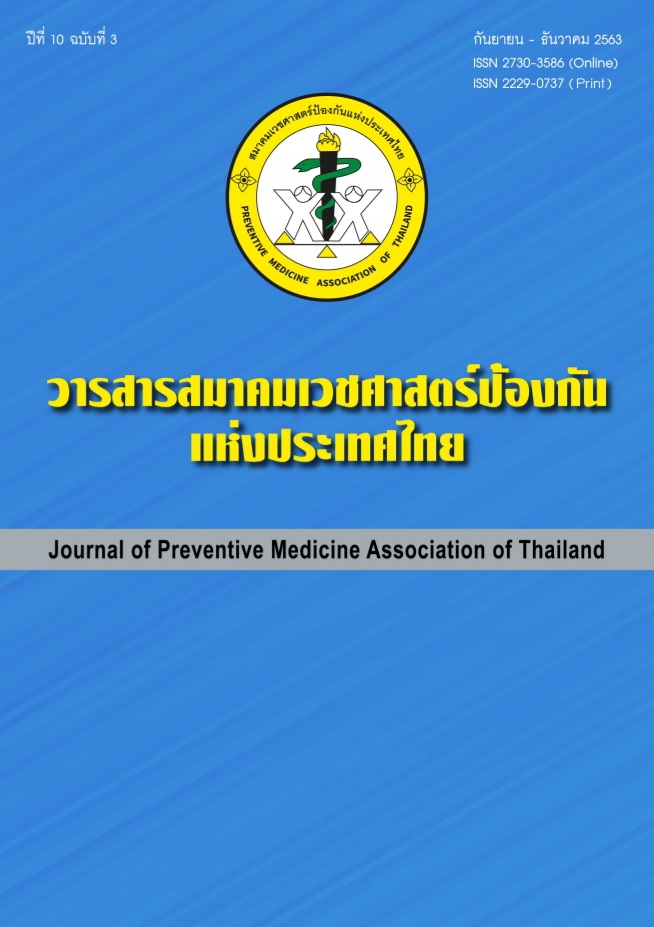The Development of Caring Pattern for Tuberculosis Pattern through Participation of Health Volunteers
Keywords:
develop model; pulmonary tuberculosis, participation, village health volunteersAbstract
This action research objective is to analyze the situation of patient care. Pulmonary Tuberculosis in Nakhon Nayok Province Develop a model of care for pulmonary tuberculosis with participation of village health volunteers and assess the results Using the conceptual framework, the theory of behavior modification of Greens and teachers and the techniques of participatory planning, AIC has 5 steps. Create an action plan 2) follow the action plan 3) Supervision and follow-up 4) Review the action plan and conclude the results 5) Evaluation A total of 68 study participants collected data from March to May 2020 and analyzed the quantitative data using descriptive statistics. The qualitative data were analyzed by content. The results of the research were as follows: 1. The village health volunteers had insufficient knowledge. There are no guidelines for the care of patients with pulmonary tuberculosis. Patients with pulmonary tuberculosis have no knowledge. Improper conduct, there is no protection and the environment in the house is unsuitable. 2. Model of care for patients with pulmonary tuberculosis with the participation of village health volunteers developed from the research, namely TB CARE MODEL 1) T=Training Village Health Volunteers 2) B = Basic Agreement care for the patient 3) C = Care for the patient 4) A = Adjustment of patient attitude 5) R = Risk Prevention and identification of risk groups 6) E = Environmental adjustment 3. Evaluation found that the village health volunteers had knowledge in taking care of the sick. Tuberculosis increased Patients are supervised and directed to take all medications every day, and the patients were satisfied with the care received.
References
2. กรมควบคุมโรค สำนักวัณโรค. แนวทางการควบคุมวัณโรคประเทศไทย พ.ศ.2561. กรุงเทพฯ : อักษรกราฟฟิคแอนด์ดีไซน์; 2561.
3. กลุ่มงานควบคุมโรคติดต่อ.. สรุปผลการดำเนินงานควบคุมป้องกันวัณโรคจังหวัดนครนายก ปี 2562. นครนายก: สำนักงานสาธารณสุขจังหวัดนครนายก; 2562.
4. Green LW, Kreuter MW. Health program planning: an educational and ecological Approach. Toronto: Mayfield Publishing Company; 2005.
5. บุญชม ศรีสะอาด. การวิจัยเบื้องต้น. พิมพ์ครั้งที่ 8. กรุงเทพฯ:สุวีริยาสาส์น; 2553.
6. ฐาณิญา แสนศรี. สาเหตุการขาดยาของผู้ป่วยวัณโรคในพื้นที่จังหวัดลพบุรี. ลพบุรี:สำนักงานสาธารณสุขจังหวัดลพบุรี; 2558.
7. สมาคมอุรเวชช์แห่งประเทศไทยในพระบรมราชูปถัมภ์. แนวทางเวชปฏิบัติการรักษาวัณโรคผู้ใหญ่ พ.ศ.2555. กรุงเทพฯ: โรงพิมพ์ชุมชนสหกรณ์การเกษตรแห่งประเทศไทย จำกัด; 2555.
8. คนึงเดช เชื่อมวราศาสตร์, พราวพิราษ ควรดำรงธรรม, ปุณยนุช พิมใจใส, จิรเดช มูลรัตน์. การพัฒนาแผนการประชุมเชิงปฏิบัติการโดยใช้กระบวนการ AIC สำหรับการจัดทำแผนพัฒนาชุมชนด้านสาธารณสุขของอาสาสมัครสาธารณสุขประจำหมู่บ้าน. วารสารมหาวิทยาลัยคริสเตียน 2556;19:199-210.
9. กาญจนา ตะลุนทิน. การควบคุมป้องกันวัณโรคในชุมชน สถานีอนามัยบ้านวังแสง ตำบลวังแสง อำเภอชนบท จังหวัดขอนแก่น. [รายงานการศึกษาอิสระปริญญาพยาบาลศาสตรมหาบัณฑิต]. ขอนแก่น: มหาวิทยาลัยขอนแก่น; 2553.
10. อวินันท์ บัวประชุม, วันเพ็ญ ปัณราช. การพัฒนาการดูแลผู้ป่วยวัณโรคปอดอย่างมีส่วนร่วมในชุมชน อำเภอเมือง จังหวัดพิษณุโลก. วารสารการพยาบาลและการดูแลสุขภาพ 2559;34:54-60.
Downloads
Published
How to Cite
Issue
Section
License
บทความที่ลงพิมพ์ในวารสารเวชศาสตร์ป้องกันแห่งประเทศไทย ถือเป็นผลงานวิชาการ งานวิจัย วิเคราะห์ วิจารณ์ เป็นความเห็นส่วนตัวของผู้นิพนธ์ กองบรรณาธิการไม่จำเป็นต้องเห็นด้วยเสมอไปและผู้นิพนธ์จะต้องรับผิดชอบต่อบทความของตนเอง






